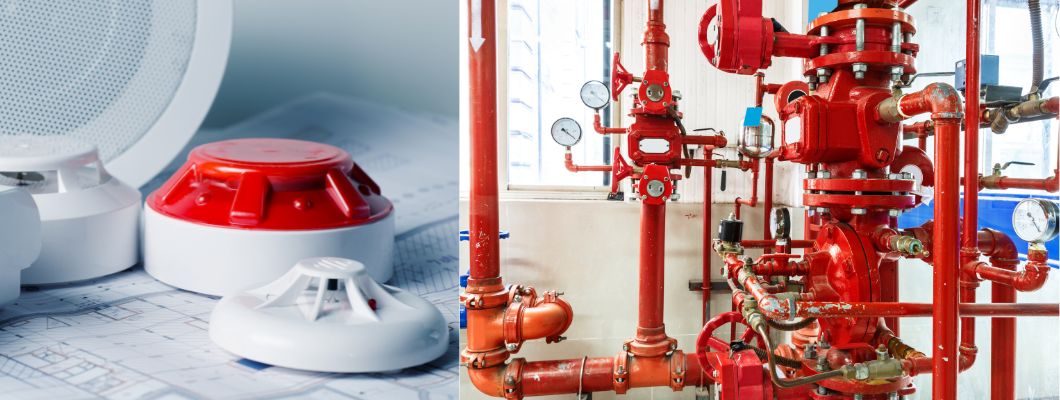
Why Every Building Needs an Automatic Fire Alarm System?
In today’s fast-paced urban world, fire hazards can strike at any moment. Whether it's a residential apartment, a corporate office or an industrial plant, fire safety is non-negotiable. One essential step toward ensuring the safety of people and property is the installation of an Automatic Fire Alarm System.
What Is an Automatic Fire Alarm System?
An automatic fire alarm system is a network of devices designed to detect and alert occupants of fire or smoke without any manual intervention. Unlike traditional systems that require a person to notice the fire and trigger an alarm, these systems work around the clock and respond instantly.
Key Components of an Automatic Fire Alarm System
-
Smoke detectors
-
Heat detectors
-
Control panels
-
Notification devices (sirens, strobe lights)
-
Manual pull stations (optional)
How It Works
The system continuously monitors the environment. The moment it detects smoke, excessive heat or a flame, it triggers alarms and, in some cases, notifies emergency responders directly.
Importance of Installing Fire Alarm Systems in Buildings
Life Safety Benefits
The primary purpose is to save lives. An automatic fire alarm gives occupants crucial time to evacuate before the fire spreads.
Protection of Property
Beyond lives, these systems help reduce damage to expensive infrastructure and valuable assets by enabling quicker response.
Legal and Regulatory Compliance
In most countries, especially in India, fire alarm systems are a legal requirement in commercial and residential buildings.
Types of Automatic Fire Alarm Systems
Conventional Fire Alarm Systems
Ideal for small buildings. These divide the premises into zones but don’t pinpoint the exact location of fire.
Addressable Fire Alarm Systems
More advanced, these systems identify the specific device that triggered the alarm.
Wireless Fire Alarm Systems
Perfect for buildings where wiring is difficult. These use radio signals for communication.
Why Every Building Should Have One?
Immediate Fire Detection
Time is critical in a fire emergency. Automatic systems detect danger faster than humans.
Faster Emergency Response
Early detection means quicker response from fire departments, minimizing damage.
Cost-Effective Risk Management
Prevention always costs less than repairs and lawsuits after a disaster.
Integration with Other Safety Systems
Automatic fire alarm systems can be linked with:
-
Sprinkler systems
-
Access control
-
Emergency lighting
-
Building Management Systems (BMS)
This ensures complete automation during emergencies.
Role of Technology in Fire Detection
Modern alarm systems come with:
-
AI-powered sensors
-
Real-time alerts via smartphones
-
Cloud monitoring
Technology has made fire detection smarter and more responsive.
Automatic Fire Alarm System Maintenance Tips
-
Test alarms monthly
-
Replace batteries every 6 months
-
Perform full system checks annually
-
Keep detectors free of dust and debris
Neglecting maintenance is as risky as not having the system at all.
Choosing the Right Fire Alarm System for Your Building
Assessing Building Type and Size
A school, a hospital and a mall have very different requirements. Choose accordingly.
Budget and Long-Term Maintenance
Don’t just go for the cheapest option. Look for value, durability and ease of servicing.
Why Sri Triveni Crafts Is the Right Partner?
Trusted Supplier of Fire Safety Solutions
At Sri Triveni Crafts, we bring years of experience and top-tier technology to protect what matters most.
Comprehensive Range of Alarm Systems
From basic conventional models to fully addressable intelligent fire detection systems, we offer solutions that suit every need.
Explore our collection: Automatic Fire Alarm System – Sri Triveni Crafts
Real-Life Incidents Highlighting the Need
We’ve seen tragic cases where buildings without fire alarm systems led to massive loss of life and property. Most of these could have been prevented with a reliable automatic system.
Common Myths About Fire Alarm Systems
-
“Small buildings don’t need them.” → False. Fires don’t discriminate.
-
“They’re too expensive.” → The cost of a fire is much higher.
-
“They give false alarms.” → Not if properly installed and maintained.
Conclusion
No matter the size or function of a building, installing an Automatic Fire Alarm System is an investment in safety, peace of mind and legal compliance. With smart systems that detect early signs of fire and alert the occupants, you can drastically reduce the risks associated with fire incidents.
At Sri Triveni Crafts, we take fire safety seriously and offer cutting-edge fire alarm systems tailored for your needs. Don’t wait for a disaster to strike—act now.
FAQs
1. What is the difference between manual and automatic fire alarm systems?
Manual systems require human activation; automatic ones detect fire and trigger alerts automatically.
2. How often should fire alarm systems be maintained?
A basic inspection should be done monthly, with professional servicing annually.
3. Are automatic fire alarm systems mandatory in India?
Yes, for most commercial and residential buildings, they are required by fire safety regulations.
4. Can automatic fire alarm systems detect smoke and heat?
Absolutely. They use multi-sensor detectors to identify smoke, heat and even flames.
5. How do I know which fire alarm system is suitable for my building?
Contact professionals like Sri Triveni Crafts who can assess your building and recommend the best fit.

17 Comment(s)
Hi colleagues, pleasant article and nice urging commented at this place, I am really enjoying by these.
We are a bunch of volunteers and starting a new scheme in our community. Your website offered us with helpful information to work on. You've done an impressive task and our entire community might be grateful to you.
Ahaa, its fastidious conversation concerning this post at this place at this website, I have read all that, so now me also commenting at this place.
Greetings! I've been reading your website for a while now and finally got the courage to go ahead and give you a shout out from Houston Tx! Just wanted to say keep up the fantastic work!
You made certain good points there. I did a search on the matter and found the majority of persons will go along with with your blog.
Way cool! Some extremely valid points! I appreciate you writing this article and the rest of the website is also very good.
Ahaa, its pleasant dialogue concerning this article here at this webpage, I have read all that, so now me also commenting here.
Some times its a pain in the ass to read what blog owners wrote but this internet site is really user pleasant!
You made some good points there. I checked on the web to find out more about the issue and found most individuals will go along with your views on this web site.
You made some really good points there. I looked on the web for more information about the issue and found most people will go along with your views on this site.
Way cool! Some very valid points! I appreciate you writing this post plus the rest of the site is also really good.
I'm now not positive where you're getting your info, however good topic. I must spend some time learning much more or figuring out more. Thank you for excellent info I was looking for this information for my mission.
These are really impressive ideas in regarding blogging. You have touched some nice factors here. Any way keep up wrinting.
Ahaa, its nice conversation concerning this paragraph here at this web site, I have read all that, so at this time me also commenting here.
Ahaa, its pleasant discussion on the topic of this article here at this weblog, I have read all that, so now me also commenting here.
The Pokemon workforce-up feature also has us smiling, because it entails the usage of technique to defeat the opponent.
I am not sure where you are getting your information, but good topic. I needs to spend some time learning more or understanding more. Thanks for fantastic info I was looking for this information for my mission.
Leave a Comment